There are 125 books in my ChatGPT database tagged as science fiction. I uploaded the list to ChatGPT and asked her to pick the titles she would put in the “post-apocalyptic” genre.
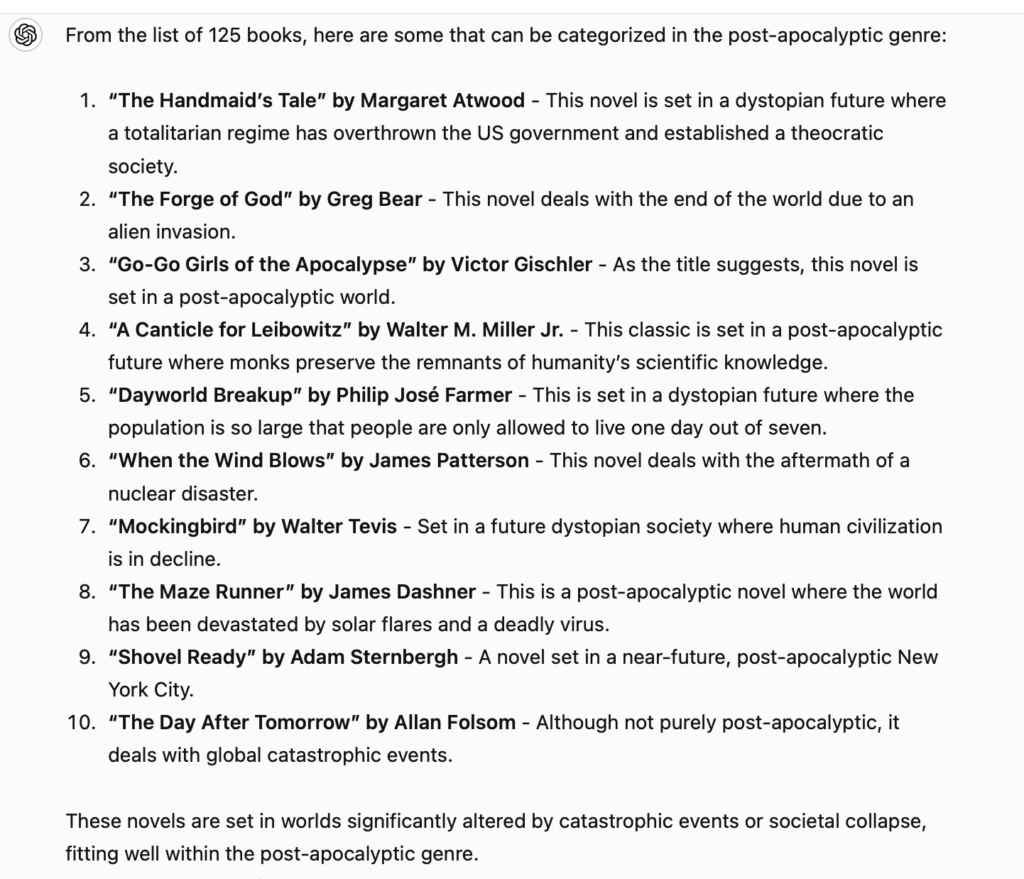
I agree with every single title. I’ll now tag these accordingly.

There are 125 books in my ChatGPT database tagged as science fiction. I uploaded the list to ChatGPT and asked her to pick the titles she would put in the “post-apocalyptic” genre.

I agree with every single title. I’ll now tag these accordingly.
LibraryThing is a social cataloging web application for storing and sharing book catalogs and various types of book metadata. It is used by authors, individuals, libraries, and publishers. It went live on August 29, 2005 and has 2,600,000 users and over 155 million books catalogued. (Wikipedia)
I started using LibraryThing in September of 2005 and currently have 896 books in the database: 596 fiction, 236 non-fiction… by 336 authors. Some of my favorites:
John Sandford (43)
Michael Connelly (33)
Lawrence Block (31)
Sue Grafton (23)
Elmore Leonard (23)
John D. Macdonald (22)
Robert B. Parker (22)
Ross Thomas (21)
Bill Granger (15)
John Grisham (15)
William Gibson (14)
Carl Hiaasen (13)
Neal Stephenson (13)
Robert K. Tanenbaum (12)
James S. A. Corey (11)
Gregory Mcdonald (11)
Robert Parker (11)
James Patterson (11)
Nelson DeMille (10)
I continue to fine-tune my tags. Still the best snap-shot of my interests.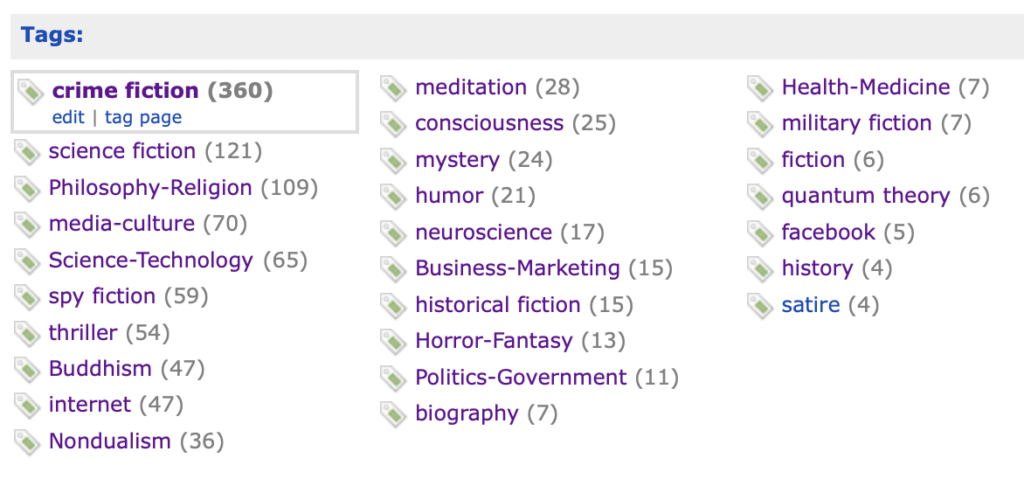
PS: Amazon says I’ve purchased more than 700 books starting in 1998.
This might not be a new feature but I just stumbled upon it today.
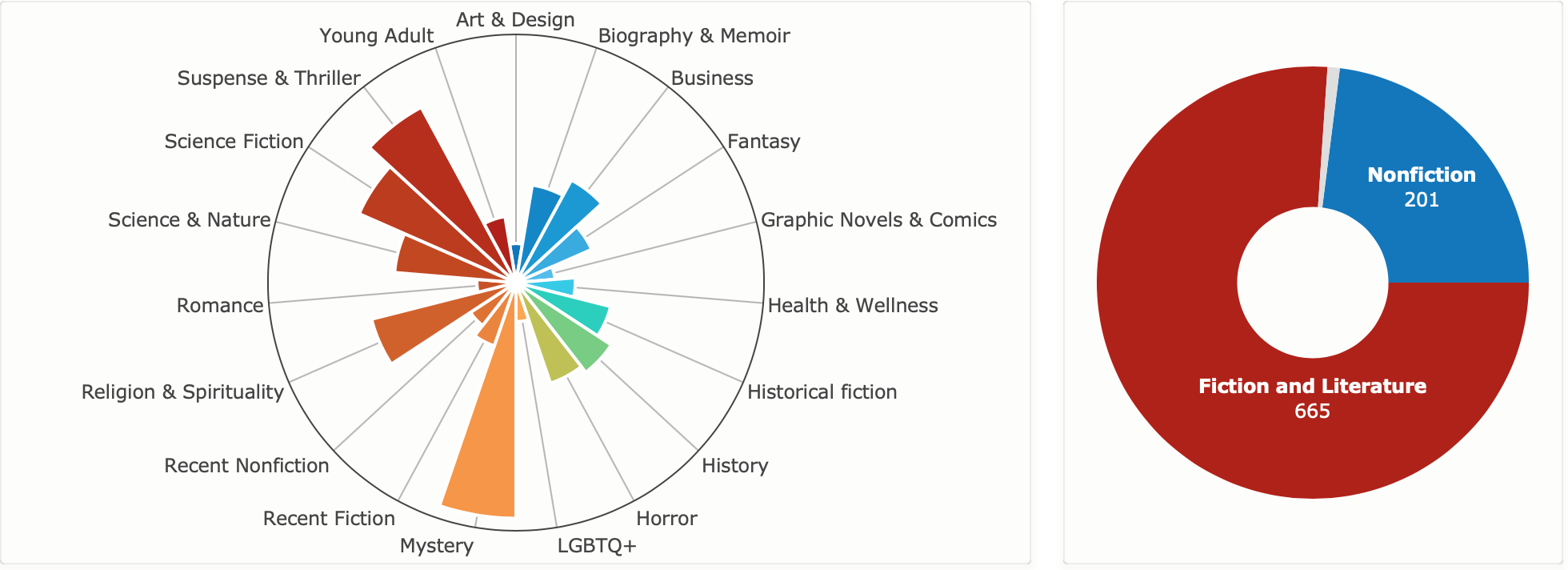
Lots more about my taste in books here.
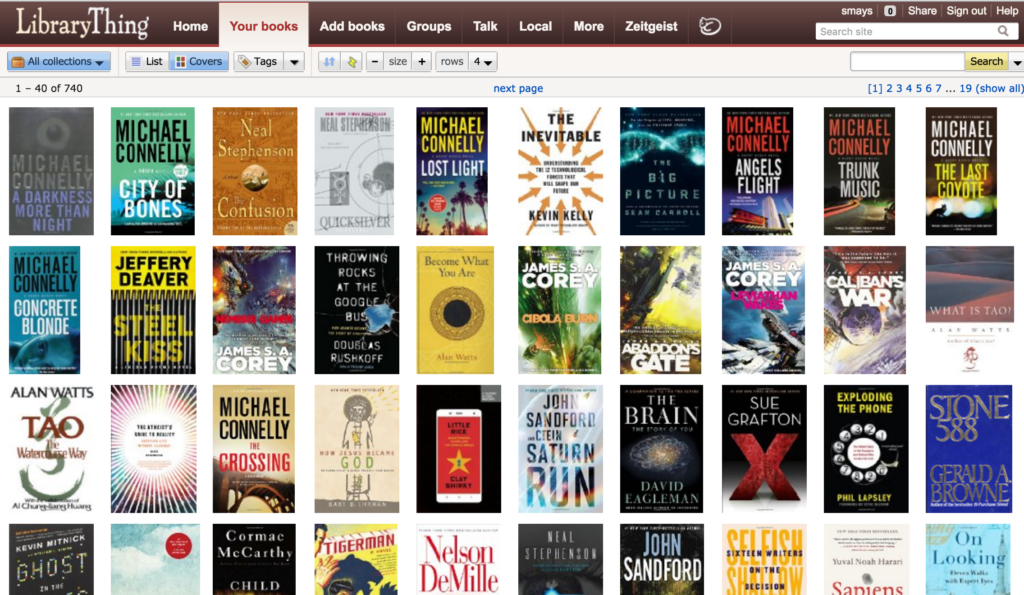 I started using LibraryThing to manage my library in 2005, about a month after the service launched. I was using a spreadsheet for this task but quickly fell in love with the tools and features LibraryThing provided. I find their smartphone app very handy.
I started using LibraryThing to manage my library in 2005, about a month after the service launched. I was using a spreadsheet for this task but quickly fell in love with the tools and features LibraryThing provided. I find their smartphone app very handy.
I have 740 titles in my LibraryThing long ago gave away most of the books. Someone calling themselves eandino2012 has more than 81 thousand titles in her/his LibraryThing.
If you’ve considered using a service like LT or Goodreads but dreaded the task of uploading all your book titles, LT has a good import tool (see below) and their smartphone app can scan ISBN barcodes. Neither of those were around back in 2005 so I entered mine one at a time.

LT does some fun stuff (total cubic feet of your books; how high if stacked, etc) and some useful (to me) stuff: list of all characters in the books in your LT.
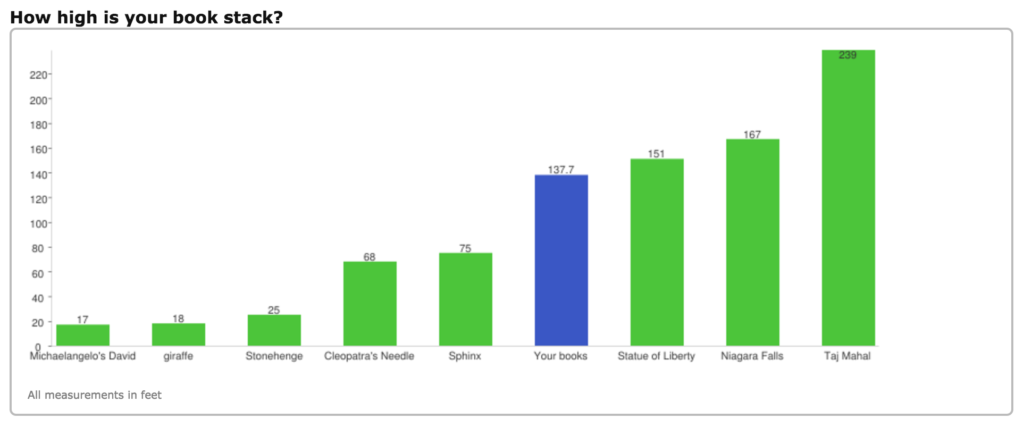
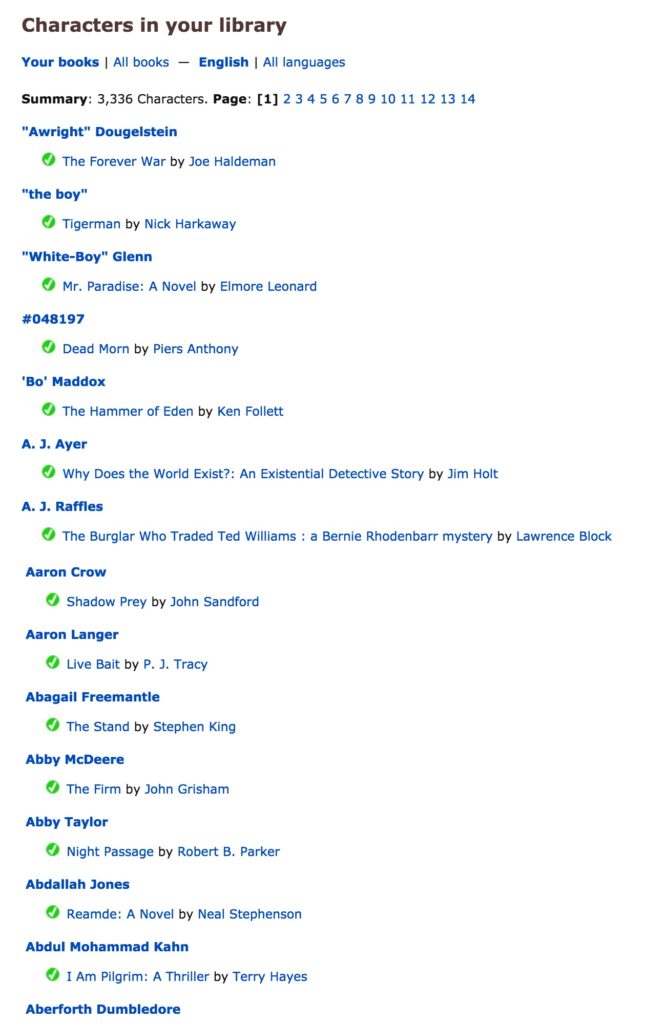
I know of no better use of my time than reading. Books are important to me. LibraryThing is a way to extend the pleasure I get from books.
I wrote this in 1988. I was 40 years old and I don’t recall what prompted this musing. I’ve done a fair amount of reading on eastern philosophies in the past 30 years and my thinking/understanding has evolved. But only a little.
Reincarnation. The word conjures up all sorts of mystical images. While I don’t recall any past life as a soldier at the Little Big Horn, it’s sort of like “the undiscovered planet” that makes sense of the orbits of the other planets.
As I think about the idea of a past existence, I feel a fondness for this “earlier me”. A sense of gratitude for whatever spiritual progress he was able to achieve. At the same time, I feel a sense of anticipation or expectation for my “next life”. And some responsibility to that future self. I’d like to move him (or her?) along as far as I can on this “cosmic lap.” To move him closer to…a perfect consciousness? Nirvana?
Mixed in with all of that is a sense of relief that I don’t have to complete everything in this lifetime. This is not the only shot I’ll get. And this awareness is vital because we all know –consciously or subconsciously– that we won’t “get it all done” in a spiritual sense. We hope (and work) for progress but a single lifetime seems hopelessly short.
So, how close am I? What if I’m only a single lifetime (only?) away from reaching this level of consciousness? Suppose I progress sufficiently in what I have left of this lifetime that I’m within “striking distance” in the next?
It’s possible I’m on my first “existence” and have many to go. Or I might have lived thousands of lives and have but a few remaining. The point is, it doesn’t matter where you are on this journey. There’s no race and no time limit. You finish when you finish and everybody finishes. And that’s a liberating thought. There’s no Heavenly Stopwatch ticking away. No point at which you must throw in the towel and face the fact you’11 never be “good enough” to get through those Pearly Gates. Eternity is not pass-fail.
Most of us fear death. We fear the unknown… what might be waiting for us. Most Western theology offers only heaven or hell. Or nothing. Poor choices, all.
What if we’re just as frightened of “being born” as we are of dying? Once you accept the idea that our souls or spirits or consciousness do not die, but are eternal, you can imagine how frightening it might be to face being born into a new existence. There is symmetry here that feels right. If my soul or consciousness is eternal, can it really be that it magically sprang into existence at the moment of my conception? One instant it didn’t exist, the next it did? It came from nowhere, out of nothing? No. I think eternity stretches in both directions.
I wish I could tell the “earlier me” that things worked out fine. There was nothing to fear. I don’t remember “dying” or being born and this life has been terrific. And why not assume the “next me” will do just as well? And will be a little more spiritually evolved thanks to the progress “this me” is making.
Why don’t (most of us) remember our “past lives?” I think it would be an awful distraction. Our purpose is to live each moment of this life fully. To grow through each day’s experience. Not to dwell on and puzzle over a life already lived. Lessons already learned. So we remain unaware of past and future lives, focused on the only life we can ever really live, this one.
And what about Heaven? Can it really be the cosmic end-of-the-line we’ve been taught? Have you ever really believed in this Sunday School heaven with streets of gold and God sitting on his judgment throne? Isn’t there more hope, more promise, in the ongoing spiritual journey?
As for Hell, we are all quite capable of creating our own, anytime, anywhere. And we do.
The idea of timeless existence fills me with a wonderful sense of anticipation. If, after 40 years, I’ve learned to stop worrying, does that mean I can go on to new challenges in this life (and the next)? If I’ve lived a life afraid to take chances, to risk, for fear of failure, will I conquer that fear next time? Can I take the spiritual progress f this life on to the next one? It seems right, doesn’t it?
And equally logical that I’ll take unsolved challenges with me as well. But how many people do you know who expect to leave their enemies behind when they go to “their reward”. Smug in the knowledge those enemies are now paying for their sins.
No, I think He or She would say, “Don’t talk to me about right or wrong, your job is your own spiritual growth. As long as you feel hate, or anger, or guilt, or worry… keep working on it. And to help you, I’ve got a limitless number of real-life situations for you to practice on.”
Does this mean I can coast through this life, dodging spiritual challenges, procrastinating on into eternity? I don’t think so. I’d love to hit that next life free and clear (to the extent that is possible). Unencumbered. I want to put worry and fear and self-doubt behind me now. I want the “next me” to have every opportunity for continued growth. Let’s drop some of this baggage. God knows how many lifetimes I’ve been hauling it (for those who need another reason for not recalling past lives).
The idea of the spirit or consciousness living on past what we call death raises the question of friends and loved ones living (again) among us. Should be sad we don’t recognize them nor they us? No.
First, they have new lessons to learn and new people and experiences will help. In our own lives we tend to find and remain in comfort zones. We do the same things, with the same people, throughout most of our lives. Only when we force ourselves (or are forced) into new situations, do we see real growth and progress. It would be like staying in the first grade for 12 years. We know the teacher and our classmates and the lessons. It’s safe and comfortable. But instead, we are forced to move on to new schools, new rooms, new teachers and classmates, new lessons. Secondly, and perhaps even more importantly, there is a unity of all consciousness. The essence of each of us, exists in all of us. That essence is part of the reborn consciousness of friends and loved ones. One more lesson: Look for and recognize the things we loved about that person, in all people.
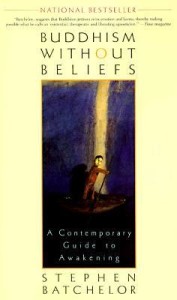 I’m not really sure what Stephen Batchelor is trying to say in Buddhism Without Beliefs. I think his main idea is there in the title. Excerpts below got some highlighter… real reviews at Amazon. This wasn’t one of my favorite books on the topic.
I’m not really sure what Stephen Batchelor is trying to say in Buddhism Without Beliefs. I think his main idea is there in the title. Excerpts below got some highlighter… real reviews at Amazon. This wasn’t one of my favorite books on the topic.
Awakening is no longer seen as something to attain in the distant future, for it is not a thing but a process — and this process is the path itself. […] It is an authentic way of being in the world.
The dharma is not something to believe in but something to do. [ Wikipedia: In Buddhism dharma means “cosmic law and order”, but is also applied to the teachings of the Buddha.]
An agnostic Buddhist is not a “believer” with claims to revealed information about supernatural or paranormal phenomena, and in this sense is not “religious.” […] The dharma is not a belief by which you will be miraculously saved. It is a method to be investigated and tried out. […] An agnostic Buddhist eschews atheism as much as theism, and is as reluctant to regard the universe as devoid of meaning as endowed with meaning.
Buddhism could be described as “the culture of awakening.”
Religions are united not be belief in God but by belief in life after death.
Regardless of what we believe, our actions will reverberate beyond our deaths. Irrespective of our personal survival, the legacy of our thoughts, words, and deeds will continue through the impressions we leave behind in the lives of those we have influenced or touched in any way.
Life is neither meaningful nor meaningless. Meaning and its absence are given to life by language and imagination.
Anguish emerges from craving for life to be other than it is.
Dharma practice is founded on resolve. […] An ongoing, heartfelt reflection on priorities, values and purpose. […] Dharma practice is the process of awakening itself: the thoughts, words, and deeds that weave the unfolding fabric of experience into a coherent whole.
The process of awakening is like walking on a footpath. When we find such a path after hours of struggling through undergrowth, we know at last that we are heading somewhere. Moreover, we suddenly find that we can move freely without obstruction. We settle into a rhythmic and easy pace. […] What counts is not so much the destination but the resolve to take the next step.
Focused awareness is difficult not because we are inept at some spiritual technology but because it threatens our sense of who we are.
The stiller the mind, the more palpable the dazzling torrent of life becomes.
The world is so saturated with the meanings given to it that those meanings seem to reside in the things themselves.
At every moment we are either inclining toward or engaged in an act: a physical movement, an utterance, a thought. Even when you decide not to act, you are still doing something: refraining.
As you sit in meditation, notice how what you are doing is the enactment of an earlier resolve. By attending to the details of this present moment, by choosing not to recollect the past or plan for the future, you are engaged in a process of creating yourself in a specific and deliberate way.
What are we but the story we keep repeating, editing, censoring, and embellishing in our heads? [I am] an unfolding narrative.
We cannot attain awakening for ourselves: we can only participate in the awakening of life.
When belief and opinion are suspended, the mind has nowhere to rest.
A lot of my recent reading has dealt with consciousness and –by extensions– reality. It has completely changed the way I see my world. Literally.
“Your senses are your windows on the world, and you probably think they do a fair job at capturing an accurate depiction of reality. Don’t kid yourself. Sensory perception – especially vision – is a figment of your imagination. “What you’re experiencing is largely the product of what’s inside your head,” says psychologist Ron Rensink at the University of British Columbia in Vancouver, Canada. “It’s informed by what comes in through your eyes, but it’s not directly reflecting it.”
“In conjuring up this “now”, the visual system has to do something even more remarkable: predict the future. Information striking the fovea cannot be relayed instantaneously to conscious perception: first it has to travel down the optic nerve and be processed by the brain. This takes several hundred milliseconds, by which time the world has moved on. And so the brain makes a prediction about what the world will look like about 200 milliseconds into the future, and that is what you see. Without this future projection you would be unable to catch a ball, dodge moving objects or walk around without crashing into things.”
“The problem with attention is that it is a limited resource. For reasons that remain unknown, most people are unable to keep track of more than four or five moving objects at once. That can lead your visual system to be oblivious to things that are staring you in the face.”
My favorite line from this piece: “Essentially we experience the brain’s best guess about what is happening now.”
Library Thing is an only database for keeping track of your books. And it does so much more than that. Today,for example, I discovered a page that illustrates the height of my books if stacked (higher than the Sphinx, shorter than the Statue of Liberty):
And that they would fill 21 U-Haul book boxes or 5 IKEA Billy bookcases. Or, if I tore the books apart and laid all the pages end to end, they would stretch for 13.25 miles.
Interesting, but not very useful. And then I found a page that listed all the characters in the books in my library. Now that is handy. Can’t remember one of the bad guys in a John D. MacDonald novel? You can find it here. [Boone “Boo” Waxwell, Bright Orange for a Shroud]
If you are daunted by the prospect of entering all of your books into the Library Thing database, I believe there are scanner apps for your smart phone.
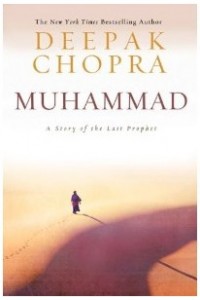 I finished the novel Muhammad yesterday and have been pondering what to say about it. I found the story interesting and well-told. I’ve read a number of other books by Deepak Chopra and like the way he writes.
I finished the novel Muhammad yesterday and have been pondering what to say about it. I found the story interesting and well-told. I’ve read a number of other books by Deepak Chopra and like the way he writes.
I think I’ll let smarter, more knowledgable folks review the book. No shortage there. So, what can I say about the novel?
If you were a kid, or have a kid, or you’ve been to a kid’s party, you’ve seen those guys that make balloon animals. Before blowing up those long skinny balloons they twist and shape into giraffes and stuff, they usually stretch the balloon. And as they inflate the balloon, they sometimes bend and turn it.
That’s what much of my reading has been like in the last few years. My thinking gets stetched and expanded, often to the breaking point.
One guy makes a hat, the next a horse. I enjoy them all and try to remember it’s all the same air inside the different colored balloons.
I knew almost nothing about the Prophet Muhammad. Now I know more. And maybe a little about the people who follow his teachings.
I fear many of those who would discuss this with me a) haven’t read the book and b) would be intent on explaining why Islam is wrong. (In their world, there is only one balloon and it’s blue and round.)
For that reason, I’ll limit comments to those who have read the book. So be prepared with a specific page reference.
I wouldn’t have thought I’d be a widget guy but my side bar is practically bristling with the little buggers. Okay, I’ve only got two. My beloved Google Shared Items and a little flickr badge.
Joining them is the My Library widget. It randomly pulls covers from My Library Thing. You are what you read.